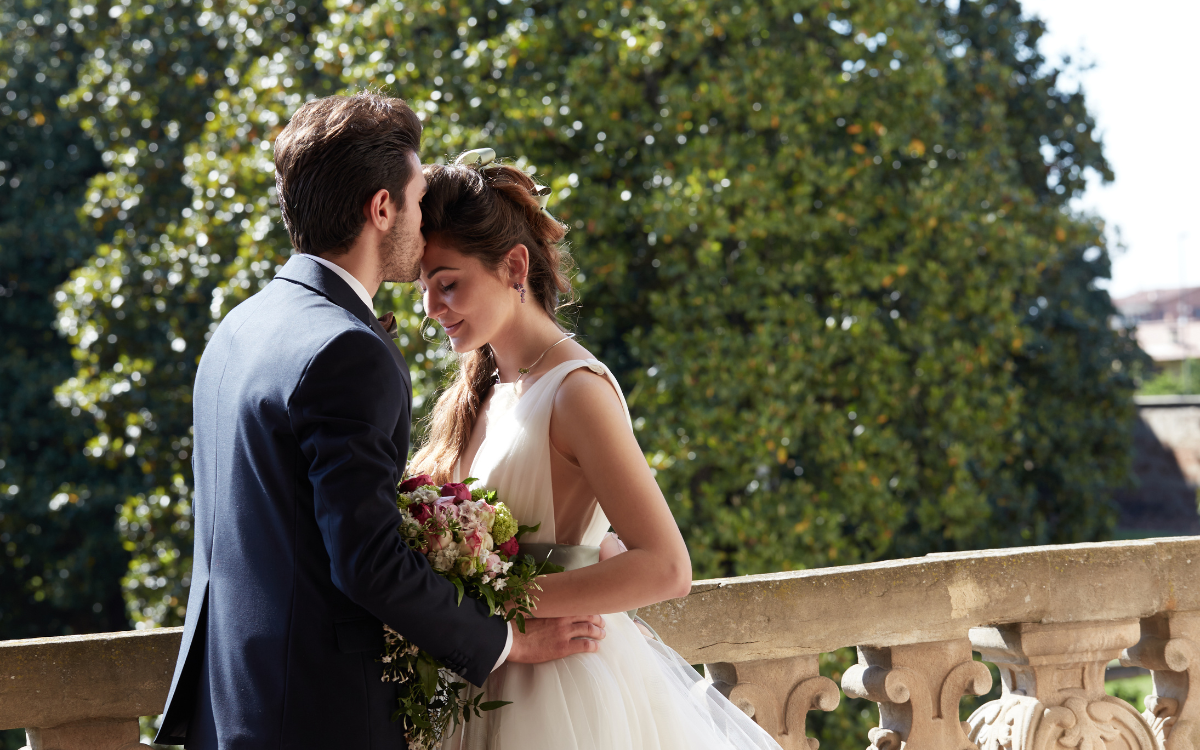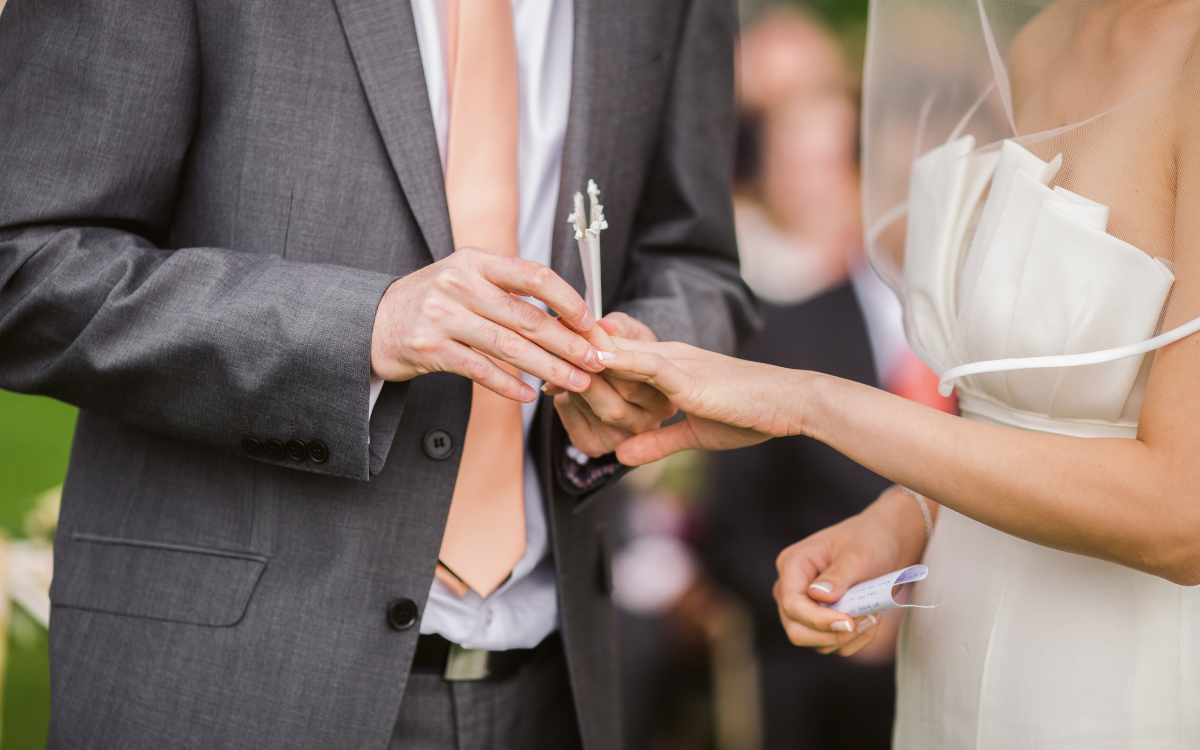Last Updated on September 30, 2024 by Ruby And The Wolf
Getting married is an exciting time, but planning a wedding can be stressful, and you might be wondering, ‘Can notaries perform weddings?’ One important decision is who will officiate your ceremony.
Many couples assume they need a priest, rabbi, or other religious officiant, but did you know that in many states, notaries public can legally perform weddings?
Keep reading to learn everything you need to know about having a notary marry you.
Can Notaries Legally Perform Weddings?

In the majority of U.S. states, notaries public who meet certain requirements can obtain the authority to officiate weddings. This gives engaged couples more flexibility and convenience when choosing an officiant.
Notary wedding laws vary by state, so couples should research their state’s specific rules. With the proper credentials, notaries make a great option for secular or non-denominational ceremonies.
Requirements to Become a Notary Wedding Officiant
The process of becoming a notary wedding celebrant differs by state, but there are some common requirements. In most cases, the notary must already hold an active notary commission.
They’ll need to file an application and pay a fee to get approved to perform marriages. Some states require taking educational classes on officiating weddings.
The notary may also have to purchase a separate wedding officiant bond. Once approved, the notary can legally officiate weddings in their state, subject to any terms of their authorization.
States Where Notaries Can Officiate Weddings
Many states allow notaries to officiate weddings, but the specific requirements vary. In California, notaries must take a course and pass an exam to earn their Marriage Celebrant designation. Florida has a similar process. Notaries in Colorado and North Carolina simply need to file an application and pay a fee. Some states, like Massachusetts, authorize certain notaries to perform marriages, while others require all notaries to apply for permission.
On the other hand, a minority of states do not authorize notaries to conduct wedding ceremonies. These include New York, New Jersey, and Connecticut. Couples planning to marry in these states will need to find an authorized officiant like a judge, minister, or other authorized celebrant if they want someone other than a notary to lead their ceremony.
Before booking a notary wedding officiant, couples should always verify the notary is currently authorized by their state to perform marriages. The application status and credentials can usually be checked on the state’s notary commission website.
The Notary’s Role and Duties During the Ceremony

When officiating a wedding, the notary public has several important legal duties. The notary must first confirm the identity of the couple through valid government-issued IDs. They will then lead the couple through the exchange of vows and pronouncement of marriage.
One of the notary’s key responsibilities is to collect the couple’s signatures on the marriage license paperwork. They must witness the newlyweds signing the license and certificate of marriage in front of them.
After the ceremony, the notary is required to fully complete the marriage license and certificate. This includes filling in all required fields and signing the documents as the person who solemnized the marriage. The notary must then file the completed license and certificate with the appropriate county or state vital records office per the state’s laws.
The notary will provide copies of the signed marriage certificate to the newly married couple as legal proof of their marriage.
A notary public takes on an important legal and ceremonial role when officiating a wedding. They must ensure all required steps are completed for the marriage to be legally binding. With the right training and preparation, notaries can officiate meaningful wedding ceremonies in many states.
How Much Does it Cost for a Notary Wedding?
The cost of having a notary public perform your wedding ceremony is often much more affordable than hiring a minister or other officiant. In many states, notaries are allowed to charge a reasonable fee for their time and services to officiate a marriage.
Typical costs range from $100 to $300 for a basic notary wedding ceremony. Some notaries may charge hourly rates, while others charge a flat fee. Factors like date, location, and how much personalization you want can affect the overall cost. Having a notary officiate at an informal backyard wedding is generally very budget-friendly.
Many notaries provide helpful resources like sample ceremony scripts, vows, and marriage certificates as part of their services. They can also assist with completing and filing all the official marriage paperwork. When considering cost, the convenience and legality notaries bring to officiating your wedding is often well worth the affordable price.
Finding and Hiring a Notary to Perform Your Wedding
Once you’ve decided to have a notary officiate your wedding, the next step is finding the right one. Here are some tips:
Ask for referrals from recently married friends or your local wedding planner. They may have great notaries to recommend. You can also search online marketplaces like Thumbtack or Upwork to find notaries in your area with wedding experience.
When reviewing notary profiles, look for ones who specialize in weddings and have additional ceremonial training. Check reviews and past client feedback about their professionalism and service.
Interview a few potential notary officiants via phone or video chat. Get a sense of their personality and ask about their wedding ceremony experience. Many will provide a free consultation.
Compare costs between notaries, but weigh it against the value of their ratings and level of customization offered. An excellent notary officiant is often worth a little extra.
Once selected, meet with your notary to discuss the ceremony details. They’ll guide you through all the legal paperwork and create a meaningful, personalized service.
With the right notary public, you can have a legally-binding wedding day that is seamless, stress-free, and still infused with your unique style and love story.
The Benefits of Having a Notary Officiate Your Wedding

Choosing to have a notary public perform your wedding ceremony provides several advantages you won’t find with other officiants.
Convenience is a major benefit. Notaries can legally officiate weddings in all 50 states, so you don’t have to stress about finding someone licensed in your location. Many notaries are also mobile and will travel to your venue.
Flexibility is another plus. Notaries are not bound by religious traditions, so they can perform meaningful secular ceremonies personalized to your style and relationship story.
Notaries also handle all the legal paperwork and documentation for you, including filing the marriage license after the ceremony. This makes the process smooth and stress-free.
Cost savings is another reason to use a notary. Their fees are often lower than other wedding officiants.
Notaries are trained professionals adept at public speaking. They will craft and deliver a polished, confident ceremony that reflects your love and personality.
For a seamless wedding experience that is legal, personalized, and budget-friendly, choosing a notary public to officiate is a great choice.
Downsides and Considerations of Notary Wedding Ceremonies
While notary weddings provide many advantages, there are some potential drawbacks to weigh as well.
Notaries are not permitted to incorporate religious readings or rituals into the ceremony. For couples wanting a faith-based wedding, a religious officiant would be a better fit.
The ceremony wording used by a notary may also feel generic to some. Notaries use standard templates and cannot provide the customized vows or readings you may get from a friend or family member officiant.
Notaries may also be less invested emotionally. A notary you just met won’t have the same connection to your love story that someone close to you would have.
Some venues have restrictions on officiants and may require approval for a notary to perform the ceremony there. Be sure to check policies with your venue ahead of time.
While notaries handle the legal paperwork, couples will still need to obtain their marriage license from the appropriate government office beforehand.
Notaries offer convenience and affordability, but some couples may prefer a more personal touch. Evaluating your priorities for the ceremony and reception is important in deciding on an officiant.
Frequently Asked Questions (FAQs)
What does a notary wedding ceremony include?
The notary will guide you through the basic required elements like exchanging vows and rings. You can also add readings, music, and other personal touches.
Do we have to get our marriage license for a notary wedding?
Yes, you’ll still need to obtain a marriage license from your local government office as you would with any other officiant.
Can a notary legally marry us?
Yes, in most states, notaries public who are commissioned to do so can legally perform marriage ceremonies. Be sure to verify the laws in your state.
Who can legally perform a marriage in Tennessee?
In Tennessee, marriages can be legally performed by licensed ministers, priests, rabbis, county clerks, judges and retired judges.
Can Tennessee notaries perform marriages?
No, Tennessee notaries public are not authorized to perform marriage ceremonies under state law. Only the officials listed above can legally officiate weddings in Tennessee.
Can a notary marry someone in FL?
Yes, Florida notaries public are legally allowed to perform marriage ceremonies in the state, provided they register with the Secretary of State.
Who can legally marry a couple in Mississippi?
In Mississippi, marriage ceremonies may be performed by ordained ministers, priests, mayors, chancery and circuit court clerks, and judges of the Mississippi Supreme Court.
Conclusion
The requirements for who can perform marriage ceremonies vary by state. Notaries public are authorized to conduct weddings in some states like Florida, but not in others like Tennessee and Mississippi. When planning a wedding, couples should check their state’s laws to determine who can legally officiate their marriage. With the proper officiant, couples can ensure their wedding is recognized as legally binding. Overall, notaries do have the authority to perform marriages in some states, but not universally across the country.

